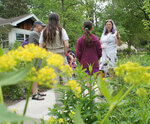
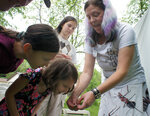
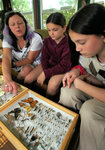
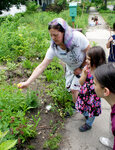
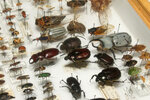
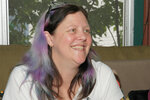
Jessica Miller still shrieks sometimes when a spider jumps on her, but the south Minneapolis environmental entomologist has found that makes her more approachable when she’s teaching classes on insects.
“People really open up. It disarms them quickly,” Miller observed.
She began her career in art history and spent nearly a decade working at places like the American Swedish Institute and Minneapolis Institute of Arts. She learned the craft of production weaving while working for a craftswoman in northeast Minneapolis. Then the economy turned and she pivoted.
“I picked bugs because I really didn’t like them,” Miller explained. She didn’t like being that girl who was scared of insects and decided to do something about it. She enrolled in the University of Minnesota and began taking entomology classes.
Turns out, it fit in well with her concern about water quality and the environment. And it all inspires new art, both her own and her students’.
“I got excited for aquatic insects when I found out they reflect the health of a water,” Miller said.
She grew up in Longfellow and has lived along Minnehaha Creek in the Ericsson neighborhood since 1997. As a nine-year-old, Miller lost her leg when a driver hit the gas pedal instead of the brake and pinned her between two cars.
For her, environmental entomology is “seeing insects as our brethren, and a natural part of our world. To encourage inviting them back to the spaces they were historically.”
Her favorite insect is the damselfly. “They need water to complete their life cycle,” Miller pointed out.
Insects do things that humans have little interest in doing, such as managing dead things. “Many of our favorite and healthy foods need pollinators, especially native bees like bumble bees,” she observed.
There are many issues facing insects today. Among them: “Habitat loss and humans forgetting to invite them back to the land we disturb for our own needs. Chemical elimination would help immensely. Many times insecticides reduce all insects and unbalance a ecosystem that would otherwise manage the naughty and destructive ones,” said Miller.
Since completing her master’s thesis on Minnehaha Creek, Miller has been heavily involved with implementing actions for improvements in the Twin Cities area. As part of the Master Water Steward Program, she installs rain gardens to aid infiltration and stormwater. These in turn provide habitat for insects such as pollinators which people depend on for food resources and options.
Through the University of Minnesota Beneficial Insect and Environmental Ecosystem, Miller did native bee identification, insect collection management, and outreach activities. She enjoys connecting people and ideas to work towards a healthier ecosystem for humans and insects.
On her eighth season with Mississippi Park Connection, she talks insects with a plethora of National Park visitors at Owamni Yamni/Saint Anthony Falls. “I love being a part of that area and have a great time with the dogs and the people in the neighborhood,” said Miller. “The wildlife in the Mississippi corridor in downtown Minneapolis has been refreshing. It aids in my insect-themed chats, helps with my connection to the earth and reminds visually how connected in our space we are.”
Metro Blooms continues to be a great partner with insect outreach and education. On contract with them, Miller is working on topics connecting to Monarch butterflies and the Rusty Patch Bumble Bee. “It is so great to see this company grow,” she observed.
Miller has been involved in insect survey work with the Prairie Island Indian Community. “I am living my best life. I just identified a Male velvet ant!” she said in 2023.
She started her own business, Dragon Wynd, in 2017 to share the wonder and fascination of insects and the services they provide. She does parties, presentations, and insect safaris. She also offers garden consults. Interested in what insect you have a picture of? Want to know more about the insects on land you steward? Ask Dragons Wynd.
Miller leads a Bug Club once a month on Saturday nights and Sunday mornings at her home along the creek. Sunday Bug Club is a casual meetup to look at and talk about insects. Participants wander a typical city lot looking at the native plants and insects while engaging in discussions about them. By paying attention, they see insect signs. Leaf chews (holes or caterpillar eatings) are reasons to stop and study. They look closely at flowers to notice who may be pollinating. There might be predators controlling other insects. They seek out insect homes, which can be horizontal or vertical – in dead plant stems, the soil or wood. Participants are welcome to bring show and tell items. Some of the meetings have themes and activities.
During the Saturday nighttime bug club, a giant black light shines on a large white sheet as Miller and bug club members hang out and wait for the insects to fly in. “Even in a city we can call in insects with a bright light,” she pointed out. Night flyers like moths, caddisflies, and beetles are frequent at night lights, as well as some day fliers such as wasps, lady beetles and flies.
Through her work, Miller seeks to inspire respect for insects’ behavior, heavy workload, and environmental needs.
Comments
No comments on this item Please log in to comment by clicking here